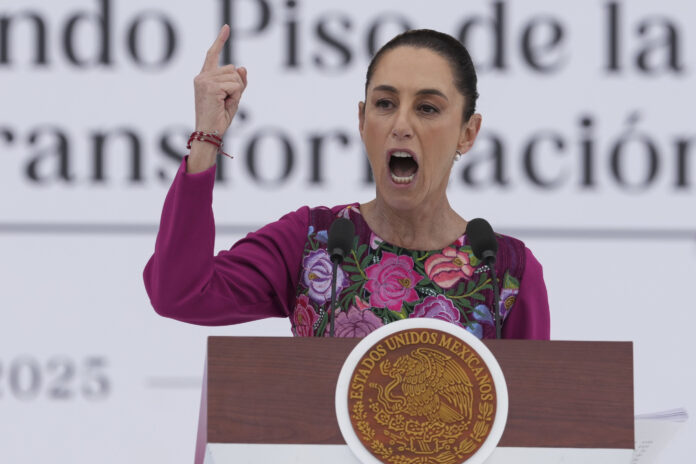Mexico is hitting back after Donald Trump’s harsh trade war tactics. President Claudia Sheinbaum has activated “Plan B,” which includes new tariffs and other measures aimed at defending the country’s economy.
The tariffs could reach up to 20% on key products like pork, cheese, fresh produce, and steel. The US is heavily reliant on Mexico for items such as avocados, with Mexico supplying 90% of the avocados consumed in the US. Sheinbaum’s government hasn’t revealed all the details yet, but the move signals a strong response to the escalating trade war.
Canada joins the fight
This news follows Canada’s decision to impose its own tariffs on US goods, worth a staggering $107 billion. Canadian Prime Minister Justin Trudeau announced the tariffs on Friday, which also targeted American imports like beer, wine, and bourbon.
Trump’s tariff plans
Trump has not backed down. Last Friday, he announced that the US would apply a 25% tariff on imports from Canada and Mexico, alongside a 10% tariff on goods from China. The tariffs on Canada’s energy exports were set at 10%.
Economists are alarmed. The Wall Street Journal called it “the dumbest trade war in history” in a scathing editorial. The US tariffs, Trump claims, are designed to push Canada and Mexico into addressing issues like illegal immigration and drug trafficking. But many critics argue these tariffs will only hurt the US economy.
Impact on American families
The Budget Lab at Yale University warns that American families could lose up to $1,200 a year in purchasing power due to these tariffs. Despite this, Trump insists that the “pain” will be worth it to create a “golden age of America.”
Mexico’s response: a broad range of tariffs
Mexico has vowed not to back down either. Sheinbaum’s government said it would initially spare the auto industry from the new tariffs but would apply them across a wide range of other goods. Products like cars, gasoline, alcohol, smartphones, and fresh produce could all see price hikes.
Trump’s justification: drugs and immigration
The US tariffs are framed as a punishment for Canada and Mexico’s inability to curb illegal drugs entering the US. Trump also argues that these tariffs will push his neighbors to reduce illegal immigration. But critics, including the Wall Street Journal, say this logic doesn’t hold water.
Trump quickly shot back at the Journal, dismissing their editorial as wrong. He blasted the “Tariff Lobby,” accusing it of trying to protect countries like Canada, Mexico, and China that, according to Trump, have been “ripping off America” for years.
In response, Sheinbaum rejected accusations from the White House, calling the claim that the Mexican government is aligned with drug cartels “slander.” She pointed out that her administration has already seized millions of fentanyl doses and arrested over 10,000 people connected to drug trafficking.
Mexico’s economy minister fights back
Mexico’s Economy Minister, Marcelo Ebrard, has also joined the fight, calling Trump’s tariffs a “flagrant violation” of the US-Mexico-Canada Agreement, or USMCA, a trade deal signed by Trump in 2018. Ebrard vowed that “Plan B is underway,” promising that Mexico would emerge victorious in the face of this trade aggression.
The tension between the US and Mexico over trade is not new. For decades, the two countries have seen a booming trade relationship, especially in sectors like agriculture and energy. In 2023, Mexico sent over $45 billion in agricultural exports to the US, including most of the US’s vegetables and fruits.
Economic impact of the tariffs on mexico
But the stakes are high. A universal 25% tariff on Mexican exports could cause a 12% drop in exports to the US, potentially reducing Mexico’s GDP by 4% in 2025. This could have a devastating impact on the Mexican economy, which depends heavily on exports to the US.
One expert, Gabriela Siller from Grupo Financiero BASE, pointed out that almost a third of Mexico’s GDP is directly tied to US exports. This makes Mexico vulnerable to the economic fallout from Trump’s tariffs.
Mexican lawmakers are not backing down either. Ricardo Monreal, leader of Mexico’s ruling party in Congress, called the US tariffs one of the “heaviest attacks” Mexico has faced in its history.
The global impact of the trade war
As the trade war intensifies, it’s clear that Mexico and Canada are not going to let Trump’s tariffs slide without a fight. The situation remains tense, with no clear resolution in sight. One thing is certain: the global economy is feeling the heat from this escalating conflict.




